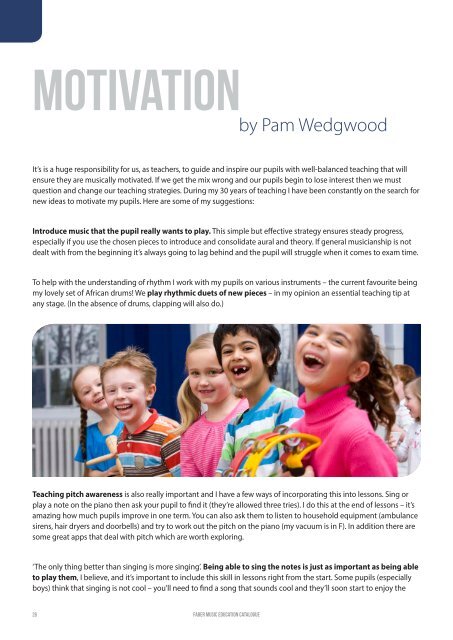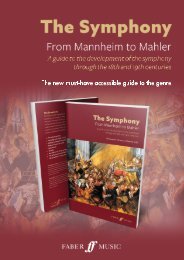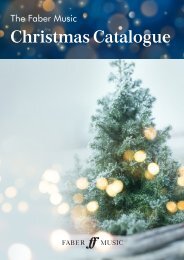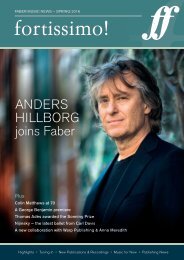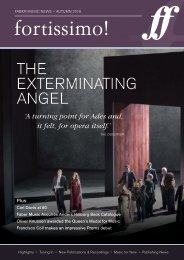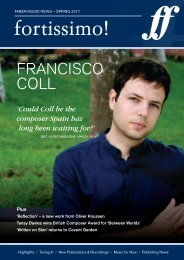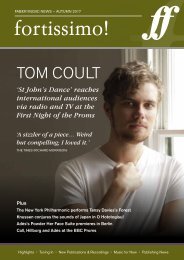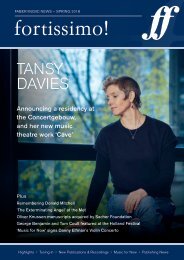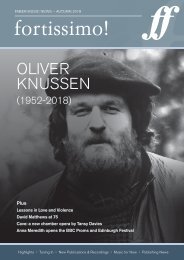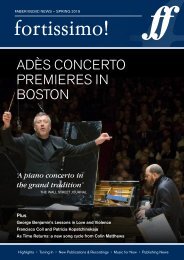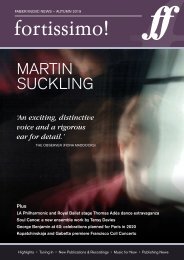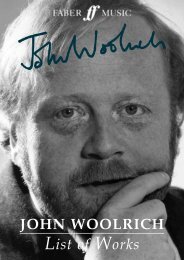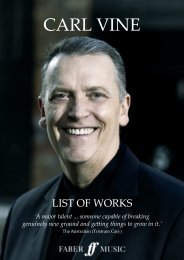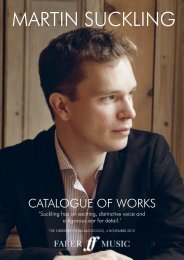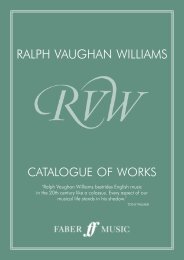Motivation by Pam Wedgwood
Composer and teacher Pam Wedgwood talks motivation.
Composer and teacher Pam Wedgwood talks motivation.
Create successful ePaper yourself
Turn your PDF publications into a flip-book with our unique Google optimized e-Paper software.
motivation<strong>by</strong> <strong>Pam</strong> <strong>Wedgwood</strong><br />
It’s is a huge responsibility for us, as teachers, to guide and inspire our pupils with well-balanced teaching that will<br />
ensure they are musically motivated. If we get the mix wrong and our pupils begin to lose interest then we must<br />
question and change our teaching strategies. During my 30 years of teaching I have been constantly on the search for<br />
new ideas to motivate my pupils. Here are some of my suggestions:<br />
Introduce music that the pupil really wants to play. This simple but effective strategy ensures steady progress,<br />
especially if you use the chosen pieces to introduce and consolidate aural and theory. If general musicianship is not<br />
dealt with from the beginning it’s always going to lag behind and the pupil will struggle when it comes to exam time.<br />
To help with the understanding of rhythm I work with my pupils on various instruments – the current favourite being<br />
my lovely set of African drums! We play rhythmic duets of new pieces – in my opinion an essential teaching tip at<br />
any stage. (In the absence of drums, clapping will also do.)<br />
Teaching pitch awareness is also really important and I have a few ways of incorporating this into lessons. Sing or<br />
play a note on the piano then ask your pupil to find it (they’re allowed three tries). I do this at the end of lessons – it’s<br />
amazing how much pupils improve in one term. You can also ask them to listen to household equipment (ambulance<br />
sirens, hair dryers and doorbells) and try to work out the pitch on the piano (my vacuum is in F). In addition there are<br />
some great apps that deal with pitch which are worth exploring.<br />
‘The only thing better than singing is more singing’. Being able to sing the notes is just as important as being able<br />
to play them, I believe, and it’s important to include this skill in lessons right from the start. Some pupils (especially<br />
boys) think that singing is not cool – you’ll need to find a song that sounds cool and they’ll soon start to enjoy the<br />
26<br />
Faber Music Education Catalogue
experience. At the end of a lesson you could also try singing the upper or lower notes of an interval (always keeping it<br />
simple!), and singing back a two-bar phrase of their ‘top’ piece.<br />
Learning theory can seem dull and uninspiring without the right approach. I teach my pupils on Sibelius: getting<br />
them to compose simple pieces <strong>by</strong> inputting all the information is a brilliant way of understanding theory and<br />
makes it much more fun. In lessons, don’t forget to use the pieces you are working on to discuss keys, accidentals,<br />
tempo marks, metronome marks and so on – always keeping it relevant and interesting.<br />
And finally, allow yourself to step outside your comfort zone and try some improvising with your pupils. Teaching<br />
your pupils modal and blues scales is a useful tool, or using the pentatonic scale on the black notes is a great way to<br />
start. You can do this from lesson one!<br />
Paul Harris<br />
pam wedgwood<br />
<strong>Pam</strong>’s musical career began with the recorder and piano, moving on to tenor<br />
horn and euphonium through the brass band tradition at her school. She then<br />
took up the cello and french horn, entering Trinity College of Music in London<br />
to study piano, horn, cello and composition at the age of sixteen. In 1988<br />
her long association with Faber Music began with the publication of Jazzin’<br />
About, a series that now numbers over 30 books and has featured on many<br />
an examination syllabus. Since then her output has grown to over 200 books<br />
including the successful Up-Grade! and After Hours instrumental series, the<br />
recorder method RecorderWorld and the adult piano method It’s never too<br />
late to play piano. In the UK she has led many workshops for the European<br />
Piano Teachers’ Association and has inspired teachers in workshops as far afield<br />
as Singapore and Malaysia, Australia and New Zealand. <strong>Pam</strong> now concentrates<br />
on composing and teaching, though she is also a keen sportswoman and<br />
international traveller!<br />
Faber Music Education Catalogue<br />
27


